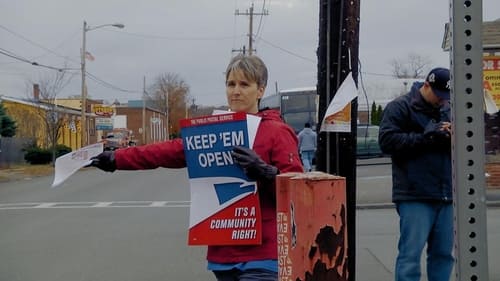
Self
The Great Postal Heist follows director Jay Galione's father, a 30-year US Post Office clerk, who was harassed, threatened, and fired for standing up for his colleagues. A moving indictment of the toxic culture and push to downsize, the documentary chronicles the journey of postal workers, experts, and advocates who experienced firsthand the abuses in the oldest federal agency in America and stood up against the USPS's notoriously violent work environment, featuring interviews with Ralph Nader and Richard Wolff. The atmosphere was a result of systematic dismantling and privatization of the trillion-dollar mail industry by lobbyists and politicians who seek to make profits at the expense of the mental health, living wages, and working conditions of their employees.

self
La industria textil fue uno de los motores de la Revolución Industrial del siglo XIX. Muchos de los trabajadores que contribuyeron a impulsarla con su mano de obra fueron las víctimas de condiciones laborales infrahumanas que ahora nos podrían parecer que son cosa del pasado, pero que por desgracia continúan siendo muy actuales.
Y así nos lo quiere recordar The True Cost, un documental que nos alerta sobre la situación del sector textil y para cuya elaboración se ha buscado financiación en Kickstarter. Un total de 903 patrocinadores han contribuido para lograr recaudar 76.546$.

Writer
With breathtaking clarity, renowned University of Massachusetts Economics Professor Richard Wolff breaks down the root causes of today's economic crisis, showing how it was decades in the making and in fact reflects seismic failures within the structures of American-style capitalism itself. Wolff traces the source of the economic crisis to the 1970s, when wages began to stagnate and American workers were forced into a dysfunctional spiral of borrowing and debt that ultimately exploded in the mortgage meltdown. By placing the crisis within this larger historical and systemic frame, Wolff argues convincingly that the proposed government "bailouts," stimulus packages, and calls for increased market regulation will not be enough to address the real causes of the crisis, in the end suggesting that far more fundamental change will be necessary to avoid future catastrophes.

himself
With breathtaking clarity, renowned University of Massachusetts Economics Professor Richard Wolff breaks down the root causes of today's economic crisis, showing how it was decades in the making and in fact reflects seismic failures within the structures of American-style capitalism itself. Wolff traces the source of the economic crisis to the 1970s, when wages began to stagnate and American workers were forced into a dysfunctional spiral of borrowing and debt that ultimately exploded in the mortgage meltdown. By placing the crisis within this larger historical and systemic frame, Wolff argues convincingly that the proposed government "bailouts," stimulus packages, and calls for increased market regulation will not be enough to address the real causes of the crisis, in the end suggesting that far more fundamental change will be necessary to avoid future catastrophes.

Himself
Interviewing scholars, industry insiders and consumers, this probing documentary delves into the effects of pornography on one's sexual identity and relationships, as well as its influence on business and American popular culture overall.



